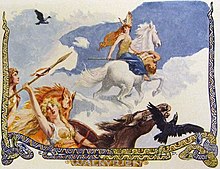valkyrie
See also: Valkyrie
English

Alternative forms
Etymology
2=welh₃Please see Module:checkparams for help with this warning.
Borrowed from Old Norse valkyrja sg (“chooser of the slain”), plural valkyrjur pl, from Proto-Germanic *walakuzjǭ. Cognate to Old English wælcyrge. First attested in English as a proper noun (Valkyries) in the 1770s; attested as a common noun (valkyries) since the 1880s.
Pronunciation
- Lua error in Module:parameters at line 290: Parameter 1 should be a valid language or etymology language code; the value "UK" is not valid. See WT:LOL and WT:LOL/E. IPA(key): /ˈvælˌkɪ.ɹi/
Audio (US): (file)
Noun
valkyrie (plural valkyries)
- (Norse mythology) Any of the female attendants of Odin, figures said to guide fallen warriors from the battlefield to Valhalla.
- Wagner's “Der Ring des Nibelungen” (1853) famously features valkyries.
Translations
any of the female attendants, or handmaidens of Odin
|
Further reading
Danish
Etymology
2=welh₃Please see Module:checkparams for help with this warning.
From Old Norse valkyrja, from Proto-Germanic *walakuzjǭ.
Pronunciation
Noun
valkyrie c (singular definite valkyrien, plural indefinite valkyrier)
Inflection
Declension of valkyrie
| common gender |
Singular | Plural | ||
|---|---|---|---|---|
| indefinite | definite | indefinite | definite | |
| nominative | valkyrie | valkyrien | valkyrier | valkyrierne |
| genitive | valkyries | valkyriens | valkyriers | valkyriernes |
Further reading
 valkyrie on the Danish Wikipedia.Wikipedia da
valkyrie on the Danish Wikipedia.Wikipedia da
Categories:
- English terms derived from the Proto-Indo-European root *ǵews-
- English terms borrowed from Old Norse
- English terms derived from Old Norse
- English terms derived from Proto-Germanic
- English 3-syllable words
- English terms with IPA pronunciation
- English terms with audio links
- English lemmas
- English nouns
- English countable nouns
- en:Norse mythology
- English terms with usage examples
- en:Death
- en:Mythological figures
- en:Personifications
- Danish terms derived from the Proto-Indo-European root *ǵews-
- Danish terms inherited from Old Norse
- Danish terms derived from Old Norse
- Danish terms inherited from Proto-Germanic
- Danish terms derived from Proto-Germanic
- Danish terms with IPA pronunciation
- Danish lemmas
- Danish nouns
- Danish common-gender nouns